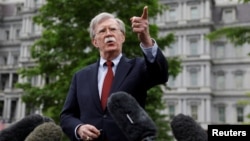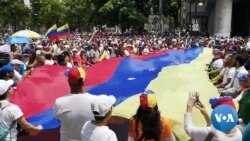The unrest in Venezuela is turning into a battleground of rhetoric between the United States and Russia.
After a telephone conversation between Secretary of State Mike Pompeo and Foreign Minister Sergey Lavrov on Wednesday, the Russian warned of “the most drastic of consequences” if the U.S. continued what he called “aggressive steps.”
The State Department was more muted, saying only that Russian and Cuban intervention was “destabilizing for Venezuela.”
But White House national security adviser John Bolton said, “This is our hemisphere. It’s not where the Russians ought to be interfering. This is a mistake on their part. It’s not going to lead to an improvement of relations.”
Pompeo said again Wednesday that the U.S. was prepared to use military action in Venezuela: “If that is what is required, this is what the United States will do.”
But Pompeo and President Donald Trump have not specified what would prompt the U.S. to intervene militarily.
WATCH: Trump Administration Warns Military Action in Venezuela 'Possible'
Cuba denies troops in Venezuela
Meanwhile, a top Cuban diplomat denied U.S. accusations that thousands of Cuban troops were on the ground in Venezuela.
“Cuba does not participate in military operations nor in security operations in Venezuela,” Cuban Chief of U.S. Affairs Carlos Fernandez de Cossio told the Associated Press.
He said the 20,000 Cubans in Venezuela were primarily medical workers.
But he did say, as hemispheric partners, Cuba and Venezuela have the sovereign right to military and intelligence cooperation.
Cuba and Russia are longtime allies of Venezuela and its socialist government. Russia has supplied economic support and military equipment to the Maduro government, while Venezuela has sent billions of dollars in oil to Cuba in exchange for medical aid.
Guaido: More demonstrations
Supporters of opposition leader Juan Guaido, who is recognized by the U.S. and more than 50 other nations as Venezuela’s rightful president, filled the streets again Wednesday, hurling rocks at police who responded with tear gas.
Guaido said a staggered industrial action would start Thursday, leading to a general strike.
“We’re going to remain in the streets until we achieve freedom for the Venezuelan people. The regime will try to increase the repression. It will try to persecute me,” he told demonstrators Wednesday.
As head of the opposition-controlled National Assembly, Guaido used the constitution to declare Nicolas Maduro’s presidency illegitimate, saying his election in December was a fraud.
Millions of Venezuelans — sick of out-of-control inflation, severe food and fuel shortages, a lack of medical care, and periodic blackouts — have fled the country.
Maduro accuses Guaido of coup
Maduro is accusing Guaido of trying to carry out a U.S.- and Colombian-supported coup and says the opposition will fail.
He said demonstrators would be prosecuted “for the serious crimes that have been committed against the constitution, the rule of law and the right to peace.”
Neither Maduro nor Guaido can succeed, however, without the support of Venezuela’s powerful military. While many of the rank-and-file soldiers have joined the opposition, Maduro still has the backing of generals and other top military chiefs.








